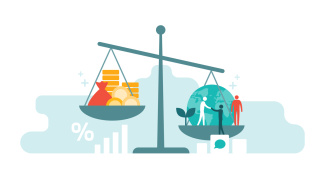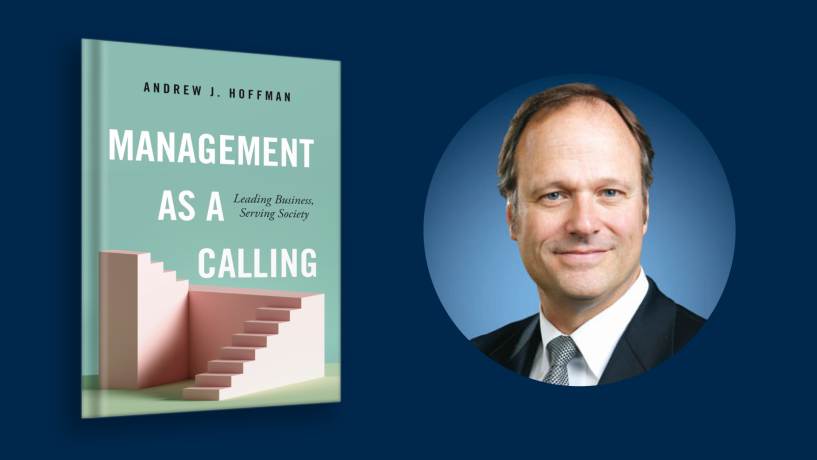New Michigan Ross Course Takes a Critical Look at Capitalism

If a top business school seems like a surprising home for a course that rethinks the core principles of capitalism, a bigger surprise might be the students’ interest in it.
When registration opened for Ross School of Business Professor Andy Hoffman’s upcoming graduate elective called Reexamining Capitalism, students quickly filled all 72 slots, with a few dozen more on a waiting list. This follows on the heels of Hoffman’s successful introduction of a course called Business in Democracy, which hits some related themes — such as examining some of the shortcomings in the way the U.S. is doing business today, and considering possible alternatives.
Hoffman recently answered a few questions about the courses, the students’ interest in them, and what it all means for business.
How did the Reexamining Capitalism course come about?
Hoffman: It's modeled in part on a course my former advisor, Rebecca Henderson at the Harvard Business School, offered and it just took off. I try to build on the spirit of that course and really drill down on some of the core issues I see.
Business students are very curious about this. I pitched the course in what is probably the worst slot, winter B term. First-years can't take it, since it's during MAP. So you only get the second-years, and I thought maybe I'd have a 20-person seminar at the most. Then it filled right up and I had a 36-person waiting list. All they had was the title and a very brief paragraph; I hadn't even developed a syllabus yet.
That’s very interesting, and it’s similar to my course on Business in Democracy. In both courses, I want students to understand the institutions in which they're going to practice their craft and be prepared to take the role of stewards of the market.
You introduced Business in Democracy in 2020, and the course won a national award. How has that course been received by students?
Hoffman: Business in Democracy is a joint offering between Michigan Ross and the Ford School of Public Policy. The first time I taught it, I asked, “What do your peers think about your taking this course?” The Ross students said a lot of their peers said, “Why would you take a course on government? What does that have to do with business?” Whereas the Ford students said that their peers were horrified that they would even set foot in the Ross building, much less take a course there, because many see business as the enemy.
Around the country, too many business students think that regulation is an unwarranted intrusion in the market, and the market would work just fine if you left the government out. At the same time, there's a sense among some within the Ford School that if the government just took everything over, then you'd be fine. The answer is somewhere in the middle.
What’s your thinking behind these courses?
Hoffman: I’ve been drifting away from the term “sustainability.” I feel like sustainability is a topic that has been ghetto-ized, and treated as some separate thing, when in fact, the challenges we face go to the core of the institutions of the market.
There are two pieces to that. One, government is critically important for the proper functioning of the market. It has been seriously demoted, and we need to bring it back. Two, students need to understand what capitalism is, what it was intended to be, how it's evolved to be what it is right now, what multiple forms exist around the world, and how it might change.
Capitalism has some problems. It can't handle environmental issues like climate change; it can't handle social issues like economic inequality. If we don't teach our students how to be stewards of the market, and to maintain the institutions to make sure they keep working, our students are going to be ill-equipped for their jobs going forward. So that's why I'm offering these courses, and I'm very pleased that there seems to be a very strong student interest.
So what does it say that business students are so interested in these topics?
Hoffman: I think there's a real frustration with the extent to which they think that the system is just not working. You should see the essays I have in my class. They think that the system is broken; that equal opportunity doesn't exist, and they see many issues of DEI and income inequality.
I think they're really disturbed by what they see as the market system going forward, and my job in this course is to try to allay a growing cynicism and help them understand what they can do about it.
And what will they be able to do about it?
Hoffman: Many of them will be going into business, and these courses will help them recognize the important role the government has to play, or the ways in which capitalism has drifted in its ability to handle the challenges of the 21st century. Similarly, Ford School students may begin to see a constructive role for business in the policy-making process. If all students understand how capitalism works, they may eventually get into a position within business or government where they can effect change.
Also, in their personal lives, their intelligent understanding of the issues around us can affect their voting, their political donations, and ultimately, their role as citizens. There was an interesting article in The Atlantic that tried to make the point that it's college-educated voters who are actually destroying democracy because they think they're informed, but they're looking at it like a tourist. They'll throw out a tweet, but then they won't do anything at the ballot box or elsewhere because cynicism has taken them over. We need to undo that, and these courses have that as a goal.







